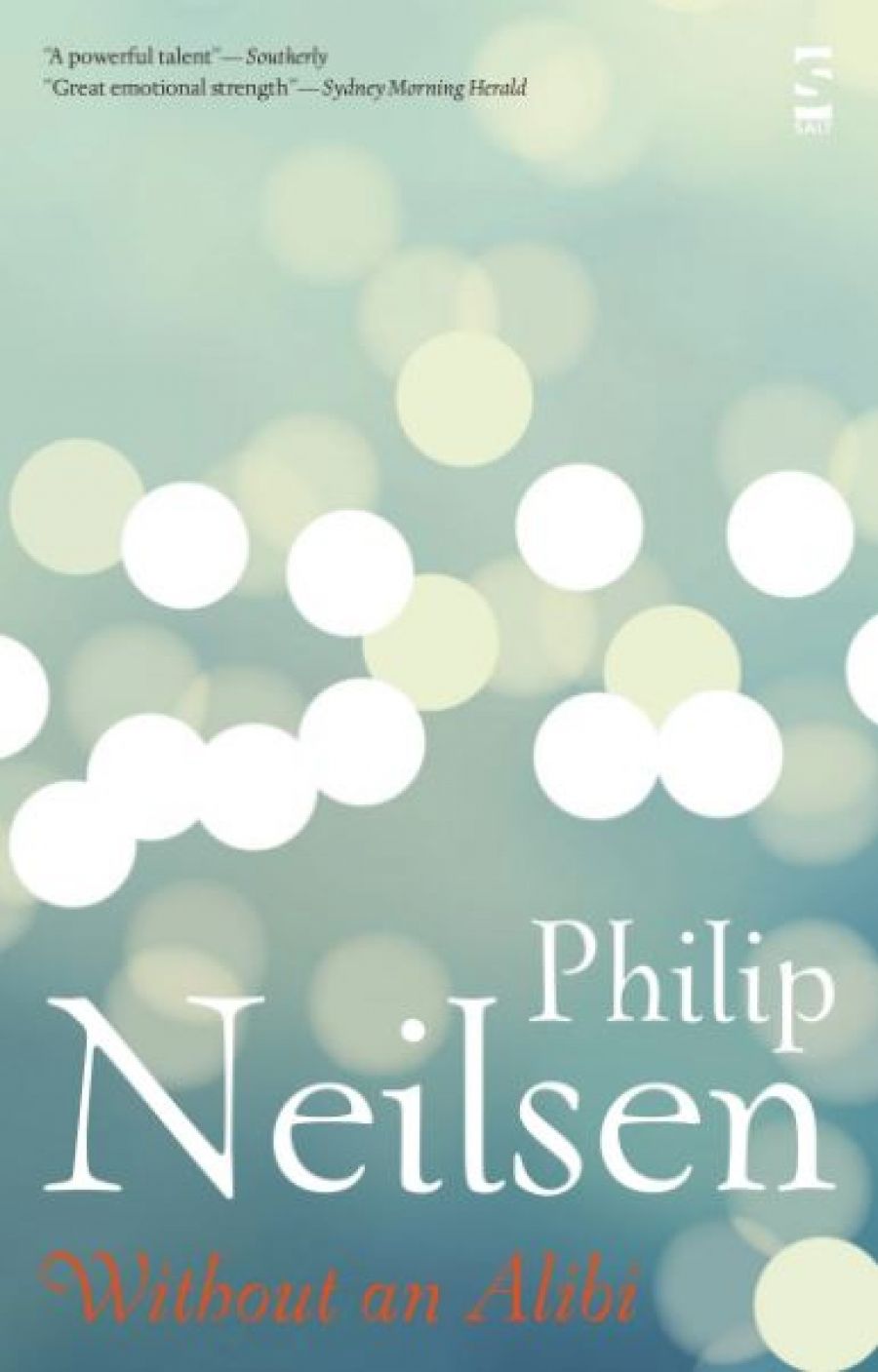
- Free Article: No
- Contents Category: Poetry
- Custom Article Title: A sceptical heart
- Review Article: Yes
- Article Title: A sceptical heart
- Online Only: No
- Custom Highlight Text:
The title of this rich and varied collection of poetry by Philip Neilsen comes from a poem entitled ‘First Creative Writing Class’:
I have only just begun to know
what a cloud is and could be.
Poetry comes without an alibi,
in lightning flashes of sanity. - Book 1 Title: Without an Alibi
- Book 1 Biblio: Salt, $35 hb, 111 pp
- Book 1 Cover Small (400 x 600):
- Book 1 Cover (800 x 1200):
The collection is divided into two sections. In the first group, subtitled ‘The Forest’, there are a number of highly engaging and memorable poems. One, ‘Ecological Love Poem’, examines some of the problems in speaking intimately within the language of love and landscape:
You and I prefer a sceptical heart. Alarmed by the fuzzy
retreat into the personal that swells poet’s tongues.
Others deploy terror-management theory, incense
or neediness. But in the space between tough hope
and another year, I write the endless charm of your face.
In reading the best of the poems aloud, one is entranced by the rapture of the word music Neilsen constructs with the most artful simplicity. The final stanza of the poem ‘Death Will be Unsighted’ is like a passage in a string quartet:
Wild plums grow in tangled weight
each September, and over there
is a courtesy of wildflowers
where the thinking animal falters
beneath a flock of parrots,
is suddenly wrapped
in the same instinctive colours,
the details of existence brilliant,
more precise,
walking on dusk.
The poem ‘After I Died’, included in the collection’s second section entitled ‘Metamorphosis’, opens with a sustained musical phrase:
It was a big surprise. I tell you now.
After the dreading and threading of it
through the cloth of living for so long.
Although the poems are crowded with ideas, the writing is compact and devoid of flourish and excessive decoration. Phrases remain in the imagination long after a first reading. The suggestion that Sir Joseph Banks is ‘the emperor of pressed plants’, the concept of ‘the bold ecstatic prayer that is engineering’ and the report that the sailors who rescued Robinson Crusoe only heard his ‘vocabulary of loneliness’, all demonstrate a poet with impressive literary skills.
One is aware in exploring the diversity of Neilsen’s collection of his questioning intelligence, knowledge, interest in the natural environment and education, and his belief in the power of storytelling. Reading the poems and absorbing the narrative through which Neilsen encases his ideas, there is a realisation of his role as witness, his skills of observation and his fascination with the human condition. Inlaid into the surface of a tough poem ‘Gangway’, there is a delicately crafted mosaic which, with great economy, captures the behaviour of the ageing:
At the shopping centre
old people whisper the latest
death of an acquaintance,
smooth the red check tablecloth
with both hands, feel a pressure
inside the rib cage:
the words was and me.
There are poems which immediately connect with the reader as they remind us of common social experience: e.g. ‘Workplace Bullying’, ‘Academic Party’, ‘Blaming Your Childhood’ or ‘Do We Have to Read the Set Books?’. The works announce their intent clearly in the title.
After reading the collection, one is convinced that in the opening poem ‘Narrative of a Leaf’, the voice, giving advice to a single leaf ‘growing a tree’ to forego ‘the luxury of individualism’, is in fact that of the poet. The final stanza does reflect some of the values discovered in the poems included in Without an Alibi:
With no rehearsal, jump into the void,
fall like an angel
with half a parachute.
Whether raked or left in peace
keep busy in community service.
Be an example without being didactic.
A kind of glory.
Neilsen has shaped this collection with the passion and attention to detail he gave to the highly attractive journal Imago: New Writing when he was editor from 1989 to 2001. He has an impressive record, with fourteen publications, including fiction for adults, young adults and children, as well as poetry. Without an Alibi is his fifth collection of poetry. It has been handsomely published by the English-based Salt Publishing.
This book deserves a significant readership. The publication underlines the range, depth and high quality of contemporary Australian poetry. In the media, the voice of Australian poetry is carried by a talented few. Writers such as Les Murray, David Malouf, Dorothy Porter and John Tranter are interviewed and quoted as if they represent poetry in this country; they are often portrayed as the victors in poetry’s competitive game. There are many different voices shaping Australian poetry today, voices that should be heard and valued. Philip Neilsen is one of those makers of poems who deserves wider readership and acknowledgment.



Comments powered by CComment